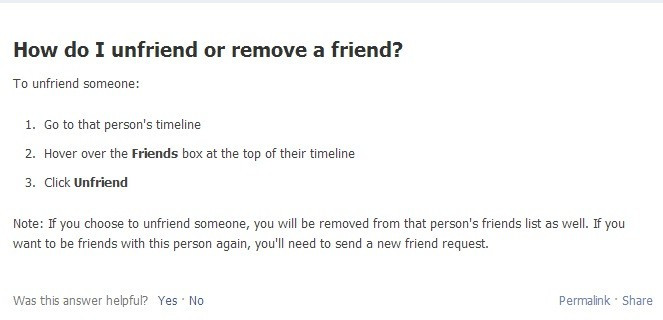Deleting Facebook Friends ‘Has Real-World Consequences’

Deleting someone as a friend on Facebook could have wider repercussions beyond the realms of cyberspace.
Researchers at the University of Colorado Denver have found that over a third of people would actively avoid someone in real life if they de-friended them on Facebook.
The study, based on 582 survey respondents, found that 40 percent would avoid the 'friend' who deleted them, 50 percent would not avoid them and 10 percent were undecided.
Study author Christopher Sibona said: "People think social networks are just for fun. But in fact what you do on those sites can have real world consequences."
Findings showed that women were more likely to avoid someone who deleted them than men.
"The gender finding that showed women tended to avoid the person who unfriended them more than men was interesting. But we really don't know why this is," Sibona said.
There were six indicators as to whether someone would avoid a person that de-friended them; if the person discussed the event afterwards, if the emotional response to the unfriending was negative and if the person unfriended thought they had been deleted because of offline actions.
Other reasons included geographical distance, if the troubled relationship was discussed before the unfriending and how strongly the person valued the relationship before the de-friending.

Sibona said: "The number one predictor was whether the person who said the relationship was over talked about it to someone else. Talking to someone is a public declaration that the friendship is over."
The researchers suggest that traditional face-to-face communication is becoming less prevalent as relationships move online.
"The cost of maintaining online relationships is really low, and in the real world, the costs are higher," Sibona said.
"In the real world, you have to talk to people, go see them to maintain face-to-face relationships. That's not the case in online relationships. "
The ease of deleting a friend at the click of a button was also highlighted as significant to the difference between online and real-world friendships: "Since it's done online there is an air of unreality to it but in fact there are real life consequences," he said.
"We are still trying to come to grips as a society on how to handle elements of social media. The etiquette is different and often quite stark."
In an earlier study about de-friending on Facebook, Sibona found the main reasons why people get deleted.
These were frequent, unimportant posts; divisive posts about religion or politics; inappropriate posts involving sexist or racist comments; and boring posts about everyday life, such as children or food.
© Copyright IBTimes 2025. All rights reserved.






















